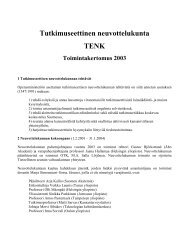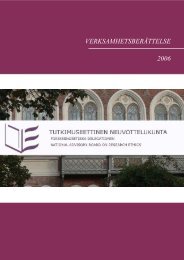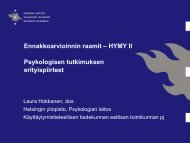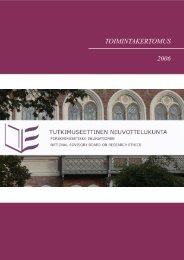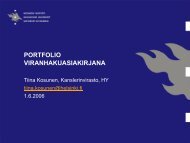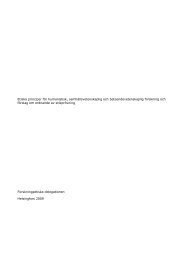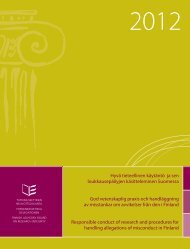1 Preventive action and education 2
ANNUAL REPORT 2008
ANNUAL REPORT 2008
- No tags were found...
You also want an ePaper? Increase the reach of your titles
YUMPU automatically turns print PDFs into web optimized ePapers that Google loves.
organizational models, for which implementing ethics review would be possible, <strong>and</strong> the costs thatthis would incur. In addition to papers from invited speakers, papers were also presented by theChair of Advisory Board, <strong>and</strong> the Chair of the working group. There were 76 registered participants.Eettinen kipu ja riski – Humanistis-yhteiskuntatieteellisen tutkimuksen riskit,ennakkoarvioinnin tarpeellisuus sekä ohjeistaminen. (Ethical pain <strong>and</strong> risk – The risks ofhumanities-social science research, the necessity for ethics review, <strong>and</strong> the guidance), 6.10.2008This was the third seminar organised by the Advisory Board <strong>and</strong> its working group to consider theethics of humanities <strong>and</strong> social science research. The topic of the seminar was the need for ethicsreview of research projects in the humanities fields. In their papers, the speakers were asked to bringup such situations where, in their own fields, they believe there to be a need for ethicalpreassessment. They were also asked to consider already completed research projects from their ownfields, for which ethical problems have subsequently arisen. Would it have been possible to avoidthese through ethics review? In addition to papers from invited speakers, papers were also presentedby the Chair of the working group <strong>and</strong> Klaus Mäkelä, member of the working group. There were 53registered participants.2. Development of mechanisms for h<strong>and</strong>ling conflicts in research ethicsIn 2008 the National Advisory Board on Research Ethics was notified of nine cases of alleged violation ofgood scientific practice, which had been h<strong>and</strong>led locally. Two of these alleged violations concernedplagiarism (one of these also included alleged falsification), two concerned alleged falsification, oneconcerned misconduct in science, one concerned fraudulence in scientific activity, <strong>and</strong> one concerned therejection of a thesis on other than scientific grounds. In one of the cases the person concerned was asked togenerally explain a commissioned research from the perspective of research ethics, <strong>and</strong> in one case theallegation focused on, among other things, that the researchers were alleged to have repeatedly attempted tojustify their research plan by presenting fabricated data to the scientific readership <strong>and</strong> misleading thescientific community <strong>and</strong> decision-makers regarding the significance of their work, as well as being guilty ofdishonesty in their writings <strong>and</strong> in their letters.One case concluded in an amicable settlement (alleged plagiarism), in one case the university did not regardthe case as being such that should generally have been dealt with under the Advisory Board’s rules ofconduct for violation of good scientific practice (alleged falsification), in one case the view was that thenotification was not sufficiently detailed as to what the violation of good scientific practice in question was.In one instance it was found that the alleged case contained no new occurrence of an alleged falsification thathad been dealt with previously, <strong>and</strong> in one case no evidence was found of anything other that scientificevaluation. One case was regarded as being misconduct in science rather than plagiarism. In one case thecarelessness <strong>and</strong> violation of good scientific practice occurring in places in a research study were notregarded as misconduct or scientific fraud. The conclusion in one case was that although the incorrectness inone method of reference did in itself deviate from good scientific practice, the complaint did not warrant any<strong>action</strong> as this was not an issue of fraud or misconduct. In one case a graduate student guilty of fraud wasexcluded from the university for a period of one year by order of the university board.In 2008 the Advisory Board was requested to give its opinion on two locally resolved cases by partiesunsatisfied with the procedure or the finding:• one allegation concerned unauthorised borrowing: the Advisory Board found the suspect had beenguilty of a misdemeanour comparable to plagiarism, but the publication committee had contributedto the violation of good scientific practice to the extent that the author’s misdemeanour was, inaccordance with the decision of the research organisation, classified as being misconduct in science.• one allegation concerned falsification: the Advisory Board found that the evaluation of acommunication based on an interview did not come within the scope of the Advisory Board’s rulesof conduct concerning good scientific practice, <strong>and</strong> the violation of such, particularly if the personbeing interviewed had not been given the opportunity to check the content of the communication.During the time of the interview the researcher is obliged to conform with good scientific practice,3
however, the Advisory Board did not find any indications of negligence in connection with theinterview.Furthermore, the Chair of the Advisory Board, many members, <strong>and</strong> the Secretary General, gave advice tovarious groups on the content of good scientific practice <strong>and</strong> of the mechanisms for h<strong>and</strong>ling violations inrespect of good scientific practice.3. Initiatives, publication <strong>and</strong> informationThe National Advisory Board on Research Ethics has maintained its active dissemination of information bymeans of its website, the seminar papers published on the site <strong>and</strong> articles published by the members <strong>and</strong> theSecretary General.Based on proposals for membership received from scientific associations, on 1.11.2007 the Advisory Boardestablished a working group (the so-called HYMY II working group) to deliberate the ethics of humanities<strong>and</strong> social science research, which continued the work carried out by the earlier ”HYMY I” working groupfrom 2002 to 2006 regarding the ethics of human sciences <strong>and</strong> pre-regulation in the humanities <strong>and</strong> socialsciences. The working group completed its work at the end of the year <strong>and</strong> submitted its findings to theNational Advisory Board on Research EthicsThe working group met eight times in 2008 <strong>and</strong> organised three seminars (see <strong>Preventive</strong> <strong>action</strong> <strong>and</strong><strong>education</strong>). The working group were very active in terms of information dissemination through publicationon the Advisory Board’s website of minutes of meetings, other background material, seminar papers, <strong>and</strong>articles published by Board members.Articles written by the members <strong>and</strong> the Secretary General <strong>and</strong> other publications:• K. Eriksson – H. Leino-Kilpi <strong>and</strong> K. Vehviläinen-Julkunen: ”Hoitotiede ja tiede-etiikka” (Treatmentscience <strong>and</strong> the ethics of science), Hoitotiede, December 2008,• Arja Kuula: ”Tarvitaanko tutkimusetiikan tarkistusta?” (Is there a need for revision of researchethics), Sosiologia 2008, pp. 135-143,• Arja Kuula: Un noveau regard sur l’éthique, in M. Dargentas – M. Brugidou – D. Le Roux – A.C.Salomon (Eds.), L’analyse seondaire en recherché qualitative: une nouvelle pratique en scienceshumaines et sociales, Paris: Lavoisier, 2008,• Sinimaaria Ranki: ”Eettisyys tutkimustoiminnan prosessissa” (Ethics in the research process),KeVer web magazine, Vol. 7, No. 4 (2008).• Liisa Nieminen: ”Laitoshoidossa oleviin vanhuksiin kohdistuvat perusoikeuksien rajoitukset”(Restricting the fundamental rights of elderly persons in institutional care), Lakimies 2008, pp. 871-893.• Liisa Nieminen: ”Lapset tutkimuskohteena: Kuka päättää lapsen osallistumisesta tutkimukseen?”(Children under research: Who decides on a child’s participation in research?), will be published inLakimies 2009,• Liisa Nieminen: Book review: Henrika Clarkeburn <strong>and</strong> Arto Mustajoki, ”Tutkijan arkipäivänetiikka” (A researcher’s everyday ethics), will be published in Lakimies 2009.4. Statements issued, international activities <strong>and</strong> other cooperationThe National Advisory Board on Research Ethics issued two expert statements in 2008:-Statement to the Finnish Medical Association on updating the draft of the Helsinki Declaration(4.2.2008)- Statement to the Ministry for Foreign Affairs of Finl<strong>and</strong> on the Government’s draft proposal on theratification of the biomedical agreement (7.2.2008).4
International meetings in which the Chair, members <strong>and</strong> the Secretary General participated:• Secretary General Salla Lötjönen: Meeting of the new <strong>and</strong> old composition of the Nordic BioethicsCommittee, Stockholm, 30.1.2008,• Secretary General Salla Lötjönen: International Stem Cell Forum, Ethics Working Party, San Francisco,USA, 25 - 27.2.2008,• Secretary General Salla Lötjönen: First Network of European Research Integrity Structures meeting,London, 11.3.2008,• Secretary General Salla Lötjönen: Office of Research Integrity: First Biennial ORI Conference onResponsible Conduct of Research (CRC) Education, Instruction <strong>and</strong> Training, 17 –19.4.2008, St. Louis,USA Washington University,• Director Paavo Löppönen: OECD Global Science Forum: Co-ordinating Committee for FacilitatingInternational Research Misconduct Investigations, 2 nd meeting, OECD Headquarters, Paris, 21 –22.4.2008.• Secretary General Salla Lötjönen: EU funded ADIT projects, ethics committee meeting, Bath, GreatBritain, 18 –21.5.2008,• Chair Eero Vuorio: From Principles to Practice: How European Research organizations implementresearch integrity guidelines, Madrid 17.-18.11.2008.• The details of the application for EU funding regarding a Great Britain proposal were agreed at ameeting of representatives of the European Research Ethics Offices held in London 11.3.2008. However,no money was received for the project.The Advisory Board, together with Academy of Finl<strong>and</strong>, reported to the European Science Foundation for aninternational study, the purpose of which was to compile <strong>and</strong> compare information on actors <strong>and</strong> proceduresrelating to research ethics in order to facilitate international cooperation. The study was published in May2008.In autumn 2008, several visitors from different universities, including South Korea, Japan <strong>and</strong> China, madevisits to familiarise themselves with the work of the Advisory Board.The Advisory Board has entered into discussions with the Academy of Finl<strong>and</strong> specifically regarding theAdvisory Board’s active role in creating a uniform model for résumés <strong>and</strong> lists of publications.The National Advisory Board on Research Ethics continued its close cooperation with the other nationalethical bodies (ETENE, TUKIJA, BTNK, GTLK <strong>and</strong> KYTÖ) in 2008. The ethical bodies participated in ajoint programme at the Turku Science Fair on 3 rd November, 2008, the theme of which was “Tissue samples<strong>and</strong> privacy”. The Advisory Board also had a joint st<strong>and</strong> together with the Committee for Public Information.The Advisory Board also prepared a programme for the Science Forum to be held in January, 2009.The negotiations that started in 2007 with UNESCO <strong>and</strong> the Ministry of Foreign Affairs to organise a visitby an African trainee for 2008 (Malawi was agreed as Finl<strong>and</strong>’s partner) had to be put on hold, however,until such time as the official cooperation agreement between Malawi <strong>and</strong> UNESCO has been made.5. Personnel <strong>and</strong> financeIn 2008 the National Advisory Board on Research Ethics had only one full time employee, the SecretaryGeneral. Salla Lötjönen acted as Secretary General from 1.1.2008 to 14.6.2008, <strong>and</strong> Liisa Nieminen from1.8.2008 onwards. They were assisted from 7.1.2008 by Terhi Tarkiainen, whom the Advisory Board sharedwith the Committee for Public Information. In addition, the Board had the use of the telephone exchange,computer <strong>and</strong> caretaker services of the Federation of Finnish Learned Societies.In 2008 the Ministry of Education granted the National Advisory Board on Research Ethics a total of EUR33,400, of which EUR 18,400 was allocated for running costs <strong>and</strong> EUR 15,000 for the Advisory Board’sexpenditure on publications <strong>and</strong> seminars, these funds were administered by the Ministry of Education. Thesalaries of the Secretary General <strong>and</strong> secretary of the National Advisory Board on Research Ethics <strong>and</strong> theclerical funds, EUR 75,182.00, were administered by the Federation of Finnish Learned Societies.5
The Annual Report was presented at a meeting of the National Advisory Board on Research Ethics 0n 9thDecember, 2008.Eero VuorioChairLiisa NieminenSecretary General6
Appendix 1List of seminars <strong>and</strong> <strong>education</strong>al events other than those organised by the National AdvisoryBoard on Research Ethics, which the Chair, members or Secretary General attended in 2008• Vice Chair Riitta Keiski, Lecture at the University of Oulu Faculty of Technology for the graduatecourse ”How to Get a PhD? - Methods <strong>and</strong> Practical Hints” on the subjects ”Research Ethics’ <strong>and</strong>’Good Practices in Researcher Education’, 8.1.2008,• Secretary General Salla Lötjönen: ”The HYMY work group of the National Advisory Board onResearch Ethics <strong>and</strong> international models of preassessment” <strong>and</strong> discussion on questions relating tothe work of those doing dissertations. Culture <strong>and</strong> inter<strong>action</strong> graduate school ethics day, Universityof Oulu Faculty of Humanities, 25.1.2008,• Secretary General Salla Lötjönen: ”Tutkimusetiikka, hyvä tieteellinen käytäntö ja vilppi” (Researchethics, good scientific practice <strong>and</strong> fraud), weekly meeting of the Maternity <strong>and</strong> Foetal Research unitat Oulu University Hospital, 13.2.2008,• Member Ari Salminen, lecture on research ethics to medical students, University of Vaasa DoctorForum, 19.2.2008,• Member Paavo Löppönen, presentation to the international Marie Curie sleep research students,University of Helsinki, 12 –14.3.2008,• Secretary General Salla Lötjönen: Ethics <strong>and</strong> integrity in scientific research, PharmacologicalWednesday Lecture series, Biomedicum, Helsinki, 19.3.2008,• Member Arja Kuula: ”Laadullisen aineiston arkistoinnin etiikka” (The ethics of archiving highquality data), Faculty of Behavioural Sciences, seminar for researchers, University of Helsinki,10.4.2008,• Chair Eero Vuorio: Fostering good scientific practice, Research ethics seminar at Åbo AkademiUniversity, 17.4.2008,• Member Sinimaaria Ranki: Good scientific practice <strong>and</strong> misconduct of research, Seminar forHEBIOT, MBIOT <strong>and</strong> MScPPs Master students, Viikki, Helsinki, 17.4.2008,• HYMY II – working group Chair Arja Kuula: Presentation at a seminar of hospital district ethicalcommittees 13 –14.5.2008, Biomedicum, Helsinki,• Chair Eero Vuorio: presentation at the TGSBB retreat organised by the Tampere Graduate School inBiomedicine <strong>and</strong> Biotechnology, Seili, 14 -16.5.2008,• Member Arja Kuula: presentations at the research seminar of the Finnish Association of LocalGovernment Studies, University of Tampere, 23.5.2008,• Secretary General Salla Lötjönen: ”TENK, tutkimusetiikka ja oikeustiede ja keskusteluväitöskirjatekijöiden kanssa, Oikeus muuttuvassa maailmassa” (National Advisory Board onResearch Ethics, research ethics <strong>and</strong> jurisprudence, <strong>and</strong> discussion with dissertation writers on”Rights in a changing world”), research ethics day for graduate students, University of HelsinkiFaculty of Law, 27.5.2008,• Chair Eero Vuorio: Ethical framework for biomedical research, National Graduate School ofMusculoskeletal Disorders <strong>and</strong> Biomaterials (TBGS) – graduate school annual meeting, 5.6.2008,• Member Arja Kuula: ”Tutkimusetiikan peruskysymyksiä” (Basic issues of research ethics). Lectureat the graduate school’s summer school on ageing, well-being <strong>and</strong> technology, University ofJyväskylä, 27.8.2008,• Member Ari Salminen, lecture on the ethics of teaching <strong>and</strong> research as part of the university’sethical guidelines, Advanced special studies on Public Management, University of Vaasa, 22.9.2008,• Member Ari Salminen, introduction to the ethics of teaching <strong>and</strong> research, to first-year students atthe University of Vaasa, 24.9.2008.• Member Arja Kuula: presentation to the National Archive’s afternoon session on the ethics ofarchiving, 13.10.2008,• Chair Eero Vuorio: ”Tutkimusetiikka – tutkijoiden omat pelisäännöt” (Research ethics – researchers’own ground rules), Baltic Graduate School, ethics afternoon, University of Turku, 22.10.2008,• Member Arja Kuula: ”Lapsi tutkimuskohteena – eettinen ennakkoarviointi ja aineistojen arkistoinninetiikka”, (The child as a research object – ethical preassessment <strong>and</strong> the ethics of data archiving),University of Tampere, 31.10.2008,• Member Arja Kuula: ”Eettiset kysymykset opinnäytteessä” (Ethical questions in theses). Lecture toMasters students at the Tampere School of Public Health, University of Tampere, 5.11.2008.7
• Secretary General Liisa Nieminen: introduction to research ethics to those involved with Universitiesof Applied Sciences, Mikkeli, 7.11.2008,• Member Arja Kuula: ”Tutkimusaineistojen etiikka” (The ethics of research data). Presentation atseminar on research data projects, University of Helsinki, 27.11.2008,• Member Arja Kuula: Qualitative research <strong>and</strong> the ethics of data archiving. Presentation at the OralHistory <strong>and</strong> Ethics symposium, Helsinki, 4.12.2008.8
National Advisory Board on Research EthicsHallituskatu 2 B00170 HELSINKIFINLANDtel. +358 9 228 69 234www.tenk.fi



